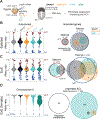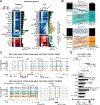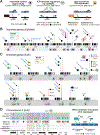Diverse epigenetic mechanisms maintain parental imprints within the embryonic and extraembryonic lineages
- PMID: 34752748
- PMCID: PMC9463566
- DOI: 10.1016/j.devcel.2021.10.010
Diverse epigenetic mechanisms maintain parental imprints within the embryonic and extraembryonic lineages
Abstract
Genomic imprinting and X chromosome inactivation (XCI) require epigenetic mechanisms to encode allele-specific expression, but how these specific tasks are accomplished at single loci or across chromosomal scales remains incompletely understood. Here, we systematically disrupt essential epigenetic pathways within polymorphic embryos in order to examine canonical and non-canonical genomic imprinting as well as XCI. We find that DNA methylation and Polycomb group repressors are indispensable for autosomal imprinting, albeit at distinct gene sets. Moreover, the extraembryonic ectoderm relies on a broader spectrum of imprinting mechanisms, including non-canonical targeting of maternal endogenous retrovirus (ERV)-driven promoters by the H3K9 methyltransferase G9a. We further identify Polycomb-dependent and -independent gene clusters on the imprinted X chromosome, which appear to reflect distinct domains of Xist-mediated suppression. From our data, we assemble a comprehensive inventory of the epigenetic pathways that maintain parent-specific imprinting in eutherian mammals, including an expanded view of the placental lineage.
Keywords: DNA methylation; X chromosome; epigenetic regulators; imprinting; placenta; scRNA-seq.
Copyright © 2021 The Authors. Published by Elsevier Inc. All rights reserved.
Conflict of interest statement
Declaration of interests The authors declare no competing interests.
Figures





References
-
- Andergassen D, Dotter CP, Kulinski TM, Guenzl PM, Bammer PC, Barlow DP, Pauler FM, and Hudson QJ (2015). Allelome.PRO, a pipeline to define allele-specific genomic features from high-throughput sequencing data. Nucleic Acids Res. 43. - PMC - PubMed
Publication types
MeSH terms
Substances
Grants and funding
LinkOut - more resources
Full Text Sources
Molecular Biology Databases

